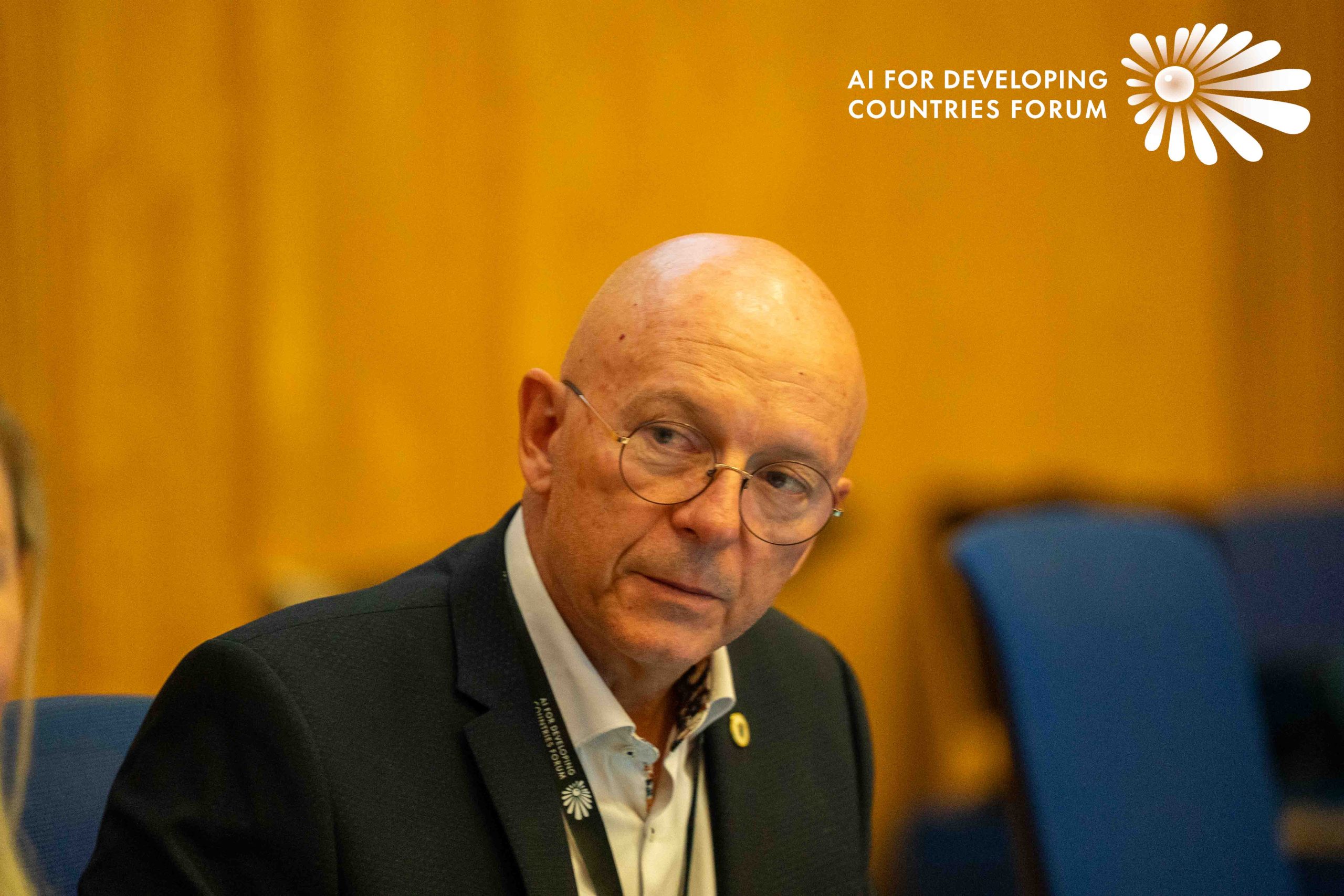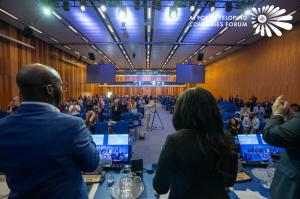AIFOD Summit at United Nations Vienna Concludes with 'Third Path' Framework for Global AI Cooperation

Laurent Lacroix, Chief Data Officer at INTERPOL, presents "Beyond Binary: Neutral Facilitation in AI Governance Path" at AIFOD Vienna Summit 2025, advocating for frameworks where multiple AI governance approaches can coexist and strengthen each other.
FAIR Framework unveiled as 30+ nations chart cooperative sovereignty beyond build vs buy, regulation vs innovation binaries
NY, UNITED STATES, July 31, 2025 /EINPresswire.com/ -- The AI For Developing Countries Forum (AIFOD) Summit 2025 concluded at the United Nations Office at Vienna with the unveiling of the groundbreaking FAIR Framework and a unified vision for "The Third Path"—innovative approaches that transcend traditional binaries of build versus buy, regulation versus innovation, and sovereignty versus openness.
AIFOD, the independent forum dedicated to AI equity, brought together ministers, ambassadors, and experts from over 30 nations for three transformative days. The summit's final day crystallized practical pathways for developing nations to achieve digital sovereignty through cooperation rather than competition, demonstrating that AI advancement need not come at the cost of cultural identity or economic independence.
Daniel Ojanic of D.O. Solutions opened the final day with a paradigm-shifting presentation: "From Cost Competition to Value Creation: How AI Enables Developing Countries to Access Global Expertise Markets." His insights set the tone for exploring how developing nations can leverage AI to move beyond being low-cost service providers to becoming high-value innovation partners in the global economy.
Laurent Lacroix, Chief Data Officer at INTERPOL, presented "Beyond Binary: Neutral Facilitation in AI Governance Path," offering crucial insights from international law enforcement on balancing security, innovation, and global cooperation. "Neutral facilitation isn't about avoiding choices—it's about creating frameworks where multiple approaches can coexist and strengthen each other," Lacroix explained.
The "Open Source as the Third Way" roundtable, moderated by Mary Walker from Level 9 Wentworth Chambers, explored whether open-source frameworks could provide the crucial middle ground between expensive proprietary systems and inadequate public solutions. Yogesh Gupta, Founder of Gaston AI, emphasized: "Open source isn't just about free software—it's about freedom to innovate, adapt, and build solutions that respect local contexts while leveraging global knowledge."
A pivotal moment came during the "Building Blocks of Digital Sovereignty Through Cooperation" panel, where Raquel Margarita Katigbak posed the fundamental question: "Should we shift from asking either/or to asking how do we cooperate our way to agency?" This reframing catalyzed discussions on cooperative sovereignty, where nations maintain autonomy while benefiting from collaborative innovation.
Dr. Rajnish Dass from Catallyst shared India's experience: "India's digital infrastructure journey shows that sovereignty doesn't mean isolation. API sovereignty allows us to maintain data control while enabling innovation through controlled access." Pascal Hetzscholdt from Wiley added crucial perspective on content protection: "The severing of creation from creator is a deep epistemic crisis. If artists need compensation for training data, why not data donors from developing countries?"
Christian Corredoira from Panama's banking sector highlighted practical challenges: "In Panama, AI sovereignty is limited by reliance on U.S. infrastructure and legal pressures. It's a geopolitical balancing act that requires innovative governance models." His insights underscored the need for frameworks that work in real-world compliance environments while maintaining operational sovereignty.
The summit's crowning achievement was the unveiling of the AIFOD FAIR Framework—Future AI Investment Responsibility. Bernardetta Yakuwa presented this comprehensive guide built on four pillars: Respectful Entry and Community Engagement, Shared Development and Benefit Sharing, Data Governance and Digital Sovereignty, and Sustainable Impact and Long-term Development.
"FAIR signifies that development should be led by fairness and mutual respect rather than the interests of the few," Yakuwa explained. The framework, developed through months of global consultation, provides practical implementation guidance for companies and investors while respecting moral and traditional values.
Key outcomes from AIFOD's third day include recognition that multiple viable paths to AI agency exist—from India's sovereignty model to blockchain approaches and regulatory experimentation; practical mechanisms for ensuring AI-generated value from Global South data circulates back to communities; governance models that transcend the regulation versus innovation binary; and the FAIR Framework as a concrete tool for responsible AI investment.
William ten Zijthoff from Carbify shared a powerful example of why coordinated governance matters: "In our reforestation project, we successfully restored land and created a natural water source. But rigid regulation then forced the sponsoring farmer to move his house. This shows we need adaptive frameworks that coordinate across sectors."
The summit concluded with the appointment of five Senior Fellows who will guide AIFOD's strategic direction, including Olivier Grenet, Head Research Quality and AI ambassador at Novartis; Susana Falcão, Executive Director of Fondation Ondjyla; Carine Allaz, CEO and cybersecurity expert at CIRISK; Lorenzo Larini, CEO of MINT; and Derrick T Davis, Director at University of Maryland.
In closing remarks, AIFOD leadership declared: "The Global South is not waiting to be invited into the future—we are already building it. We've done more than talk about AI's unequal future—we've begun to draw the blueprint for a new investment paradigm that sees the Global South not as a frontier to be exploited, but as a force to be followed."
The AIFOD Vienna Summit 2025 demonstrated that "The Third Path" is not a compromise but a breakthrough—showing that through cooperative sovereignty, nations can achieve digital agency without sacrificing identity, innovation without exploitation, and progress that benefits all of humanity. As delegates return to their nations, they carry not just ideas but practical frameworks, proven models, and a global network committed to ensuring AI serves as a bridge to shared prosperity rather than a wedge driving societies apart.
Dawid Wiktor
Media Scope Group
email us here
Legal Disclaimer:
EIN Presswire provides this news content "as is" without warranty of any kind. We do not accept any responsibility or liability for the accuracy, content, images, videos, licenses, completeness, legality, or reliability of the information contained in this article. If you have any complaints or copyright issues related to this article, kindly contact the author above.


